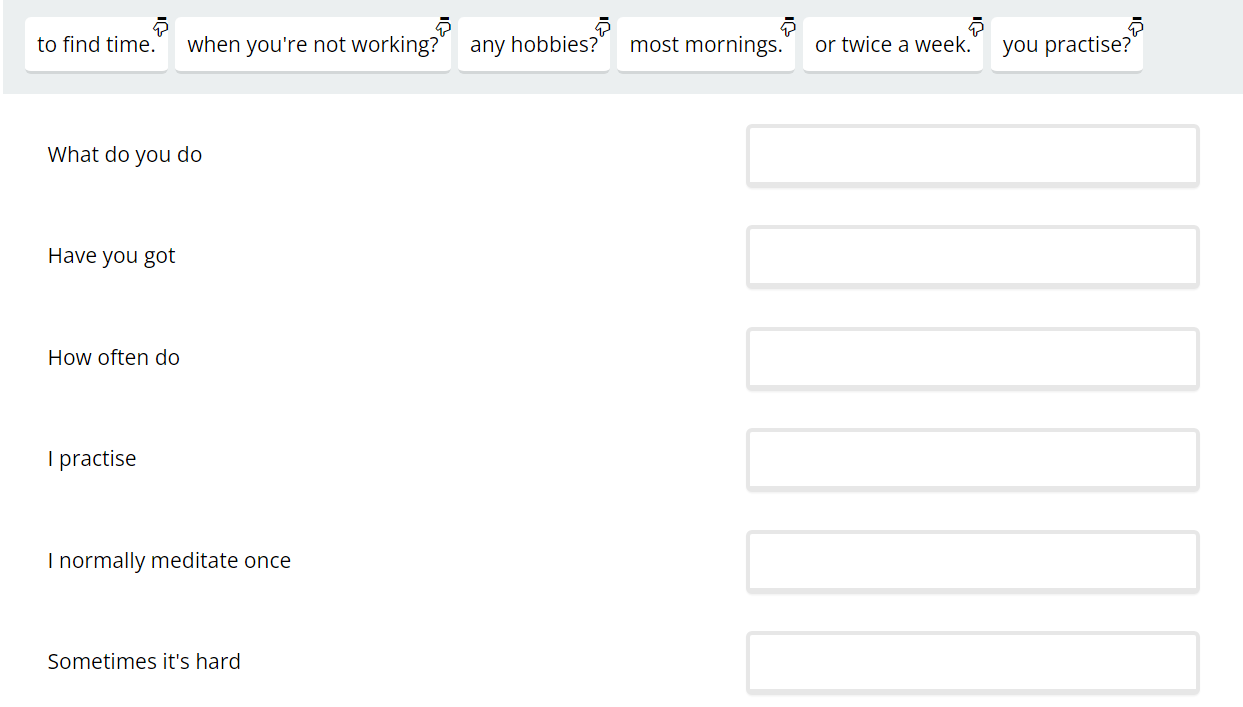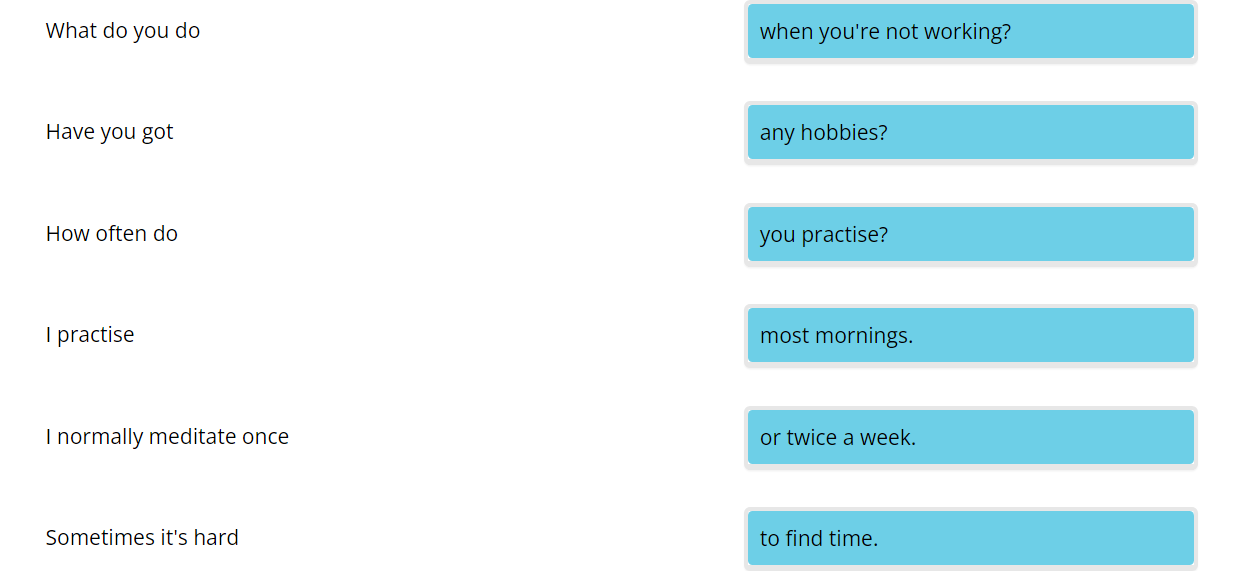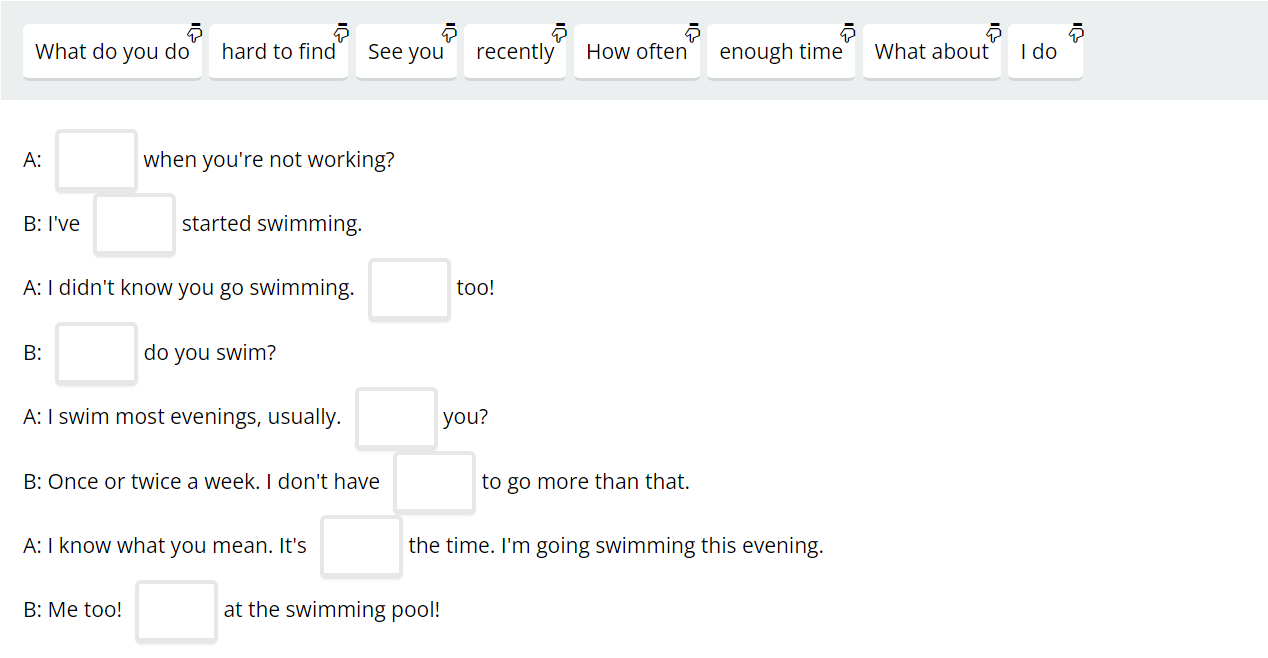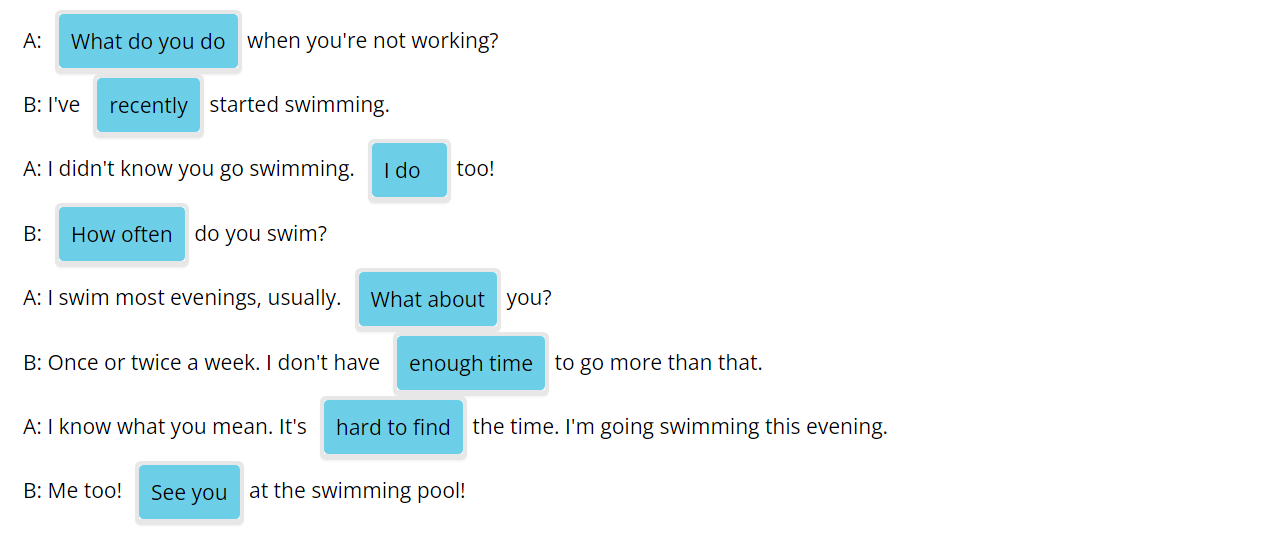【A2-Speaking】04 Talking about personal interests-谈论个人兴趣
【A2-Speaking】04 Talking about personal interests-谈论个人兴趣

In this video, Emir asks Paul about his hobbies. Listen to the language they use for talking about personal interests and practise saying the useful phrases.
在这段视频中,埃米尔询问保罗他的爱好。聆听他们谈论个人兴趣时使用的语言,并练习说出有用的短语。
Do the preparation exercise first. Then watch the video and do the exercises to check your understanding and practise the language.
先做准备练习。然后观看视频并做练习来检查您的理解和练习语言。
Preparation准备
Talking about personal interests – preparation
Match the two parts of the sentences.
- Question
First part
1.What do you do
2.Have you got
3.How often do
4.I practise
5.I normally meditate once
6.Sometimes it’s hardSecond part
a. any hobbies?
b. you practise?
c. or twice a week.
d. to find time.
e. when you’re not working?
f. most mornings.

- Answer
1.What do you do (when you’re not working?)
2.Have you got (any hobbies?)
3.How often do (you practise?)
4.I practise (most mornings.)
5.I normally meditate once (or twice a week.)
6.Sometimes it’s hard (to find time.)

Transcript对话脚本
English
Ana: Hi! I’m Ana. Welcome to What to Say!
Do you know what to say when you talk about your personal interests? Listen out for useful language for talking about personal interests. Then, we’ll practise saying the new phrases – after this.
Emir: Hi, Paul. I made you a cup of tea. Just how you like it, milk and two sugars.
Paul: Oh, thanks, Emir.
Emir: You’re welcome. So what do you do when you’re not working?
Paul: Oh, umm, not much. I’m always really tired in the evenings and at weekends.
Emir: Haven’t you got any hobbies?
Paul: Well, I’ve recently started doing meditation.
Emir: I didn’t know you did meditation. I do too!
Paul: Oh, right. So, um, how often do you practise?
Emir: Most mornings usually, but if it’s really busy, then sometimes it’s hard to find time.
Paul: Yeah, I know what you mean. I normally meditate once or twice a week. I never have enough time to do it more than that.
Emir: What are you doing now?
Paul: Nothing much, just drinking my tea …
Ana: Hello again! Now that’s something you don’t see in the office every day! So, did you notice the useful phrases used for talking about your personal interests? Listen to me and then repeat.
What do you do when you’re not working?
I didn’t know you did meditation.
I do too!
How often do you practise?
Most mornings, usually.
Sometimes it’s hard to find time.
I normally meditate once or twice a week.
I never have enough time.
Ana: Try and use some of these phrases the next time you talk about your personal interests in English. Bye for now!
English-Chinese
Ana: Hi! I’m Ana. Welcome to What to Say!
安娜:嗨!我是安娜。欢迎来到说什么!Do you know what to say when you talk about your personal interests? Listen out for useful language for talking about personal interests. Then, we’ll practise saying the new phrases – after this.
当你谈论你的个人兴趣时,你知道该说什么吗?留意谈论个人兴趣的有用语言。然后,我们将练习说新短语——在此之后。Emir: Hi, Paul. I made you a cup of tea. Just how you like it, milk and two sugars.
埃米尔:嗨,保罗。我给你泡了一杯茶。只要你喜欢就好,牛奶和两颗糖。Paul: Oh, thanks, Emir.
保罗:哦,谢谢,埃米尔。Emir: You’re welcome. So what do you do when you’re not working?
埃米尔: 不客气。那么当你不工作的时候你会做什么呢?Paul: Oh, umm, not much. I’m always really tired in the evenings and at weekends.
保罗:哦,嗯,不多。晚上和周末我总是很累。Emir: Haven’t you got any hobbies?
埃米尔:你没有什么爱好吗?Paul: Well, I’ve recently started doing meditation.
保罗:嗯,我最近开始冥想。Emir: I didn’t know you did meditation. I do too!
埃米尔:我不知道你会冥想。我也做!Paul: Oh, right. So, um, how often do you practise?
保罗:哦,对了。那么,嗯,你多久练习一次?Emir: Most mornings usually, but if it’s really busy, then sometimes it’s hard to find time.
埃米尔:通常是大多数早上,但如果真的很忙,有时就很难找到时间。Paul: Yeah, I know what you mean. I normally meditate once or twice a week. I never have enough time to do it more than that.
保罗:是的,我知道你的意思。我通常每周冥想一到两次。我从来没有足够的时间做更多的事情。Emir: What are you doing now?
埃米尔:你现在在做什么?Paul: Nothing much, just drinking my tea …
保罗:没什么,只是喝我的茶……Ana: Hello again! Now that’s something you don’t see in the office every day! So, did you notice the useful phrases used for talking about your personal interests? Listen to me and then repeat.
安娜:你好!现在,这是您每天在办公室都看不到的东西!那么,您是否注意到用于谈论您个人兴趣的有用短语?听我说,然后重复。What do you do when you’re not working?
当你不工作的时候你会做什么?I didn’t know you did meditation.
我不知道你有冥想。I do too!
我也做!How often do you practise?
你多久练习一次?Most mornings, usually.
通常,大多数早晨。Sometimes it’s hard to find time.
有时很难找到时间。I normally meditate once or twice a week.
我通常每周冥想一到两次。I never have enough time.
我的时间从来都不够。Ana: Try and use some of these phrases the next time you talk about your personal interests in English. Bye for now!
安娜:下次当你用英语谈论你的个人兴趣时,尝试使用其中一些短语。暂时再见!
Task 1任务1
Talking about personal interests – 1
Choose the best summary of the video.
Question
Choose the best summary of the video.
Emir and Paul talk about all the different things they do when they aren’t working.
Paul asks Emir if he would like to try meditation.
Emir and Paul find out that they have the same hobby – meditation.
- Answer
Emir and Paul talk about all the different things they do when they aren’t working.
Paul asks Emir if he would like to try meditation.
✔Emir and Paul find out that they have the same hobby – meditation.

Task 2任务2
Talking about personal interests – 2
Put the words in the correct order.
- Question
- do when working? not do you What you’re
- at in weekends. I’m always the evenings and really tire
- doing started meditation. recently I’ve
- know meditation. I you did do too! I didn’t
- do How practise? you often
- but sometimes time. it’s hard mornings usually, Most to find
- meditate a I week. twice normally once or
- have than that. I more never to do it enough time
- Answer
- What do you do when you’re not working.
- I’m always really tired in the evenings and at weekends.
- I’ve recently started doing meditation.
- I didn’t know you did meditation. I do too!
- How often do you practise?
- Most mornings usually, but sometimes it’s hard to find time.
- I normally meditate once or twice a week.
- I never have enough time to do it more than that.
Task 3任务3
Talking about personal interests – 3
Complete the sentences.
- Question
How often I do See you What do you do
enough time What about recently hard to find
A: (1) when you’re not working?
B: I’ve (2) started swimming.
A: I didn’t know you go swimming. (3) too!
B: (4) do you swim?
A: I swim most evenings, usually. (5) you?
B: Once or twice a week. I don’t have (6) to go more than that.
A: I know what you mean. It’s (7) the time. I’m going swimming this evening.
B: Me too! (8) at the swimming pool!

- Answer
A: (What do you do) when you’re not working?
B: I’ve (recently) started swimming.
A: I didn’t know you go swimming. (I do) too!
B: (How often) do you swim?
A: I swim most evenings, usually. (What about) you?
B: Once or twice a week. I don’t have (enough time) to go more than that.
A: I know what you mean. It’s (hard to find) the time. I’m going swimming this evening.
B: Me too! (See you) at the swimming pool!

Discussion讨论
What do you do when you’re not working? 当你不工作的时候你会做什么?
Vocabulary
meditation
- 简易
英/ˌmedɪˈteɪʃ(ə)n/美/ˌmedɪˈteɪʃ(ə)n/
n.冥想,打坐;沉思,深思;(关于某主题的)感想,沉思录考研 | IELTS | GRE
复数meditations - 《柯林斯英汉双解大词典》
meditation/ˌmɛdɪˈteɪʃən/|CET6+
N-UNCOUNT Meditation is the act of remaining in a silent and calm state for a period of time, as part of a religious training, or so that you are more able to deal with the problems of everyday life. 沉思• Many busy executives have begun to practise yoga and meditation.
许多工作繁忙的主管已开始练习瑜伽和冥想。
meditate
- 简易
英/ˈmedɪteɪt/美/ˈmedɪteɪt/
v.(宗教中)默想,冥想;思考,沉思(meditate on/upon);暗自策划,谋划考研 | TOEFL | GRE | SAT
第三人称单数meditates现在分词meditating过去式meditated过去分词meditated
- 《柯林斯英汉双解大词典》
meditate/ˈmɛdɪˌteɪt/|TEM8
meditating meditated meditates
V-I If you meditate on something, you think about it very carefully and deeply for a long time. 深思
• On the day her son began school, she meditated on the uncertainties of his future.
在她儿子入学那天,她深思了有关他未来的种种不确定因素。V-I If you meditate you remain in a silent and calm state for a period of time, as part of a religious training or so that you are more able to deal with the problems and difficulties of everyday life. 冥想
• I was meditating, and reached a higher state of consciousness.
我正在冥想,并进入了一种更高的意识境界。